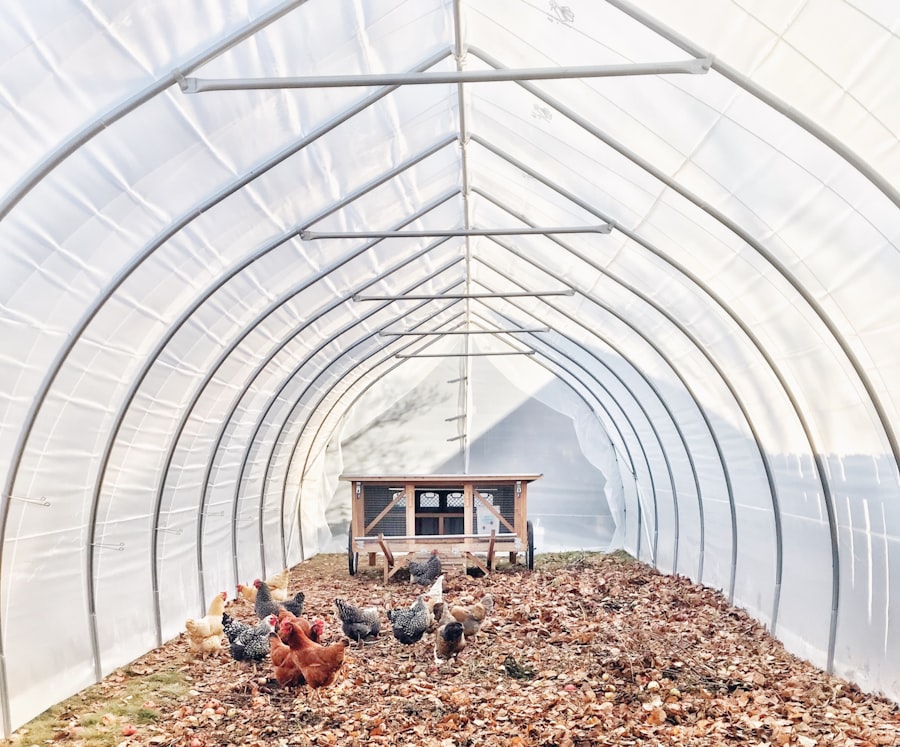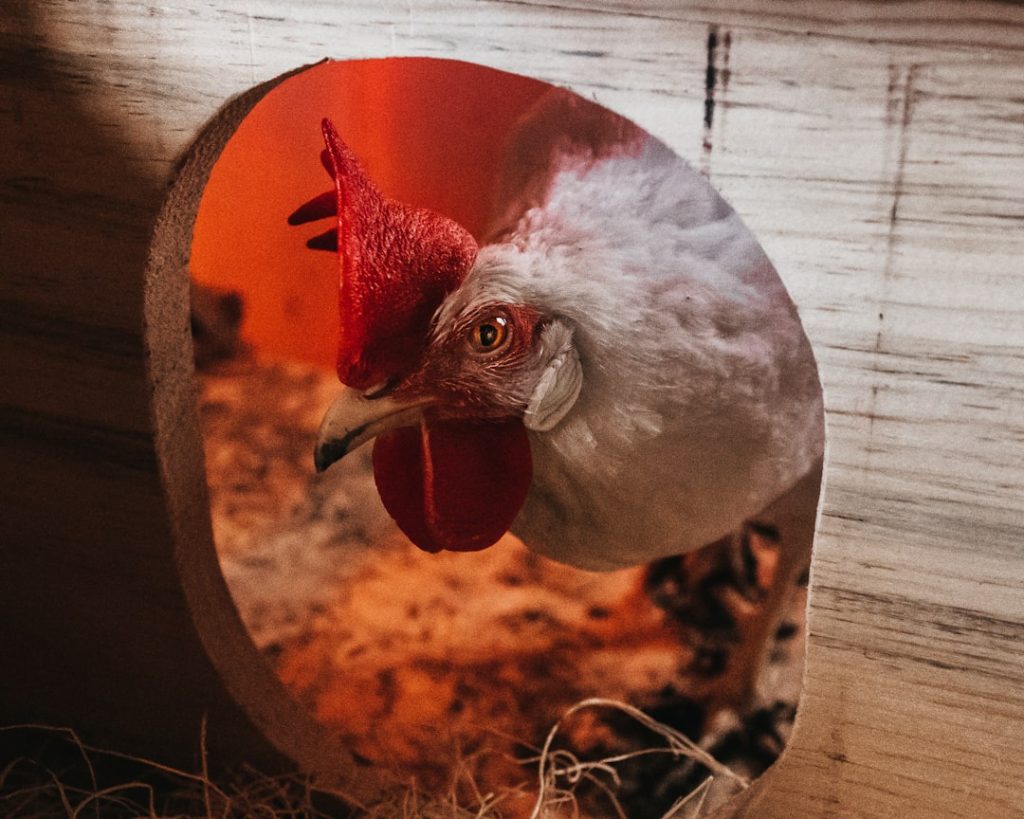When raising chickens, providing adequate space is essential for their health and welfare. Chickens require sufficient room to move, stretch their wings, and engage in natural behaviors like scratching and dust bathing. A general guideline is to allocate a minimum of 2-3 square feet per chicken inside the coop and 8-10 square feet per chicken in an outdoor run.
This space allocation helps prevent aggression and pecking order issues while allowing for free movement. Beyond the coop and run, chickens benefit from access to a larger free-range area. This enables them to forage for insects, graze on grass, and enjoy sunlight.
Free-ranging provides both physical exercise and mental stimulation, which are crucial for their overall well-being. Allowing chickens to roam in a more expansive area promotes natural behaviors and enhances their quality of life. Adequate space provision is vital not only for the physical health of chickens but also for their mental and emotional well-being.
By ensuring chickens have sufficient room to move and express natural behaviors, caretakers can promote a healthier and more contented flock.
Table of Contents
Key Takeaways
- Providing at least 2 square feet of space per chicken is essential for their well-being and health.
- A balanced diet including grains, vegetables, and protein is crucial for proper nutrition of chickens.
- Enrichment activities such as pecking objects and dust baths are important for mental stimulation and physical exercise.
- Creating a safe and comfortable environment with proper ventilation and protection from extreme weather is vital for the chickens’ well-being.
- Socializing with other chickens is important for their mental and emotional health, and helps prevent loneliness and boredom.
Ensuring Proper Nutrition
Nutritional Foundation
A good quality commercial feed that is specifically formulated for chickens is a great foundation for their diet. Additionally, supplementing their diet with fresh fruits and vegetables, as well as occasional treats such as mealworms or kitchen scraps, can provide added nutrition and variety.
Hydration is Key
Chickens need constant access to water to stay hydrated, regulate their body temperature, and aid in digestion. It’s important to regularly clean and refill their water containers to ensure that the water is free from contaminants and debris.
Impact on Overall Health and Happiness
Proper nutrition not only supports the physical health of chickens but also contributes to their overall well-being and happiness.
Offering Enrichment Activities

Enrichment activities are essential for keeping chickens mentally stimulated and engaged. Chickens are intelligent animals that benefit from having opportunities to engage in natural behaviors such as scratching, pecking, and dust bathing. Providing environmental enrichment such as perches, dust bathing areas, and hanging treats can help keep chickens active and entertained.
Additionally, introducing novel objects or toys into their environment can pique their curiosity and provide mental stimulation. Allowing chickens to free-range in a larger area also offers enrichment opportunities as they can forage for insects, explore new surroundings, and engage in natural behaviors. Enrichment activities not only keep chickens mentally stimulated but also help reduce boredom and prevent negative behaviors such as feather pecking or aggression.
By providing a stimulating environment, chickens can lead a more fulfilling and contented life.
Creating a Safe and Comfortable Environment
Creating a safe and comfortable environment is essential for the overall well-being of chickens. The coop should be well-ventilated to ensure good air quality and prevent the buildup of ammonia from droppings. It should also be predator-proof with secure latches on doors and windows to keep out potential threats such as raccoons, foxes, or birds of prey.
Additionally, the coop should be kept clean and dry to prevent the spread of diseases and parasites. Providing comfortable bedding such as straw or wood shavings in the coop helps keep chickens warm, dry, and comfortable. Nesting boxes should be provided for hens to lay their eggs in a quiet and private space.
Access to shade in the outdoor run is also important to protect chickens from extreme heat or inclement weather. By creating a safe and comfortable environment, chickens can feel secure and relaxed, which is essential for their overall well-being.
Chickens are social animals that thrive in the company of their flock mates. It’s important to provide opportunities for chickens to socialize with each other to prevent loneliness and promote positive social behaviors. Introducing new chickens to the flock should be done gradually to minimize stress and aggression.
Providing multiple feeding and watering stations can help reduce competition and prevent bullying among flock members. Observing the flock dynamics and intervening if necessary can help maintain a harmonious social environment. Chickens that are able to socialize with other flock members are less likely to exhibit negative behaviors such as feather pecking or aggression.
Socializing with other chickens not only promotes positive social interactions but also contributes to the overall well-being of the flock.
Regular Health Check-ups

Daily Observations
Observing chickens daily for any changes in behavior, appetite, or appearance can help identify health concerns. This daily monitoring can help chicken owners catch any potential issues before they become severe.
Preventative Measures
Preventative measures such as vaccinations, deworming, and parasite control are vital for maintaining the health of the flock. By taking these proactive steps, chicken owners can reduce the risk of disease and illness in their chickens.
Environmental Factors
Providing a clean environment, proper nutrition, and access to fresh water also plays a significant role in the overall health of chickens. By ensuring these basic needs are met, chicken owners can create a healthy and thriving environment for their flock.
By prioritizing regular health check-ups and implementing these preventative measures, chicken owners can ensure that their flock remains healthy and thriving.
Minimizing Stress and Predation risks
Minimizing stress and predation risks is crucial for the overall well-being of chickens. Stress can weaken the immune system and make chickens more susceptible to diseases. Minimizing stressors such as loud noises, sudden changes in routine, or overcrowding can help keep chickens calm and content.
Additionally, providing hiding spots in the coop or outdoor run can help chickens feel secure and protected from potential threats. Predation risks should also be minimized to ensure the safety of the flock. Securing the coop with sturdy fencing, locks, and predator-proofing measures can help prevent attacks from predators.
Providing roosting bars inside the coop can also keep chickens safe from ground-dwelling predators at night. By minimizing stress and predation risks, chicken owners can create a safe and secure environment for their flock to thrive. In conclusion, providing adequate space, proper nutrition, enrichment activities, a safe and comfortable environment, socialization with other chickens, regular health check-ups, and minimizing stress and predation risks are all essential components of ensuring the overall well-being of chickens.
By prioritizing these aspects of care, chicken owners can help their flock lead healthy, happy, and fulfilling lives.
If you’re looking for ways to keep your chickens happy, you might want to consider building a garden chicken coop. This article from Poultry Wizard provides helpful tips and advice on creating a comfortable and enjoyable living space for your feathered friends. Check out the Garden Chicken Coop article for more information on how to keep your chickens content and healthy.
FAQs
What are some ways to keep chickens happy?
Some ways to keep chickens happy include providing them with a spacious and clean living environment, access to fresh water and high-quality feed, opportunities for exercise and foraging, and social interaction with other chickens.
Why is it important to keep chickens happy?
Keeping chickens happy is important for their overall well-being, health, and productivity. Happy chickens are less stressed, more active, and more likely to lay eggs regularly.
What kind of living environment do chickens need to be happy?
Chickens need a clean and spacious living environment with access to fresh air, natural light, and protection from predators. They also need a comfortable roosting area and nesting boxes for laying eggs.
How can I provide opportunities for exercise and foraging for my chickens?
You can provide opportunities for exercise and foraging by allowing your chickens to free-range in a safe and secure outdoor area, providing them with toys and objects to peck at, and scattering their feed in a way that encourages them to search for it.
What are some signs that my chickens are happy?
Some signs that your chickens are happy include active foraging and scratching, socializing with other chickens, sunbathing, and vocalizing contented clucks and sounds. Additionally, happy chickens will lay eggs regularly and have a healthy appetite.
Meet Walter, the feathered-friend fanatic of Florida! Nestled in the sunshine state, Walter struts through life with his feathered companions, clucking his way to happiness. With a coop that’s fancier than a five-star hotel, he’s the Don Juan of the chicken world. When he’s not teaching his hens to do the cha-cha, you’ll find him in a heated debate with his prized rooster, Sir Clucks-a-Lot. Walter’s poultry passion is no yolk; he’s the sunny-side-up guy you never knew you needed in your flock of friends!







